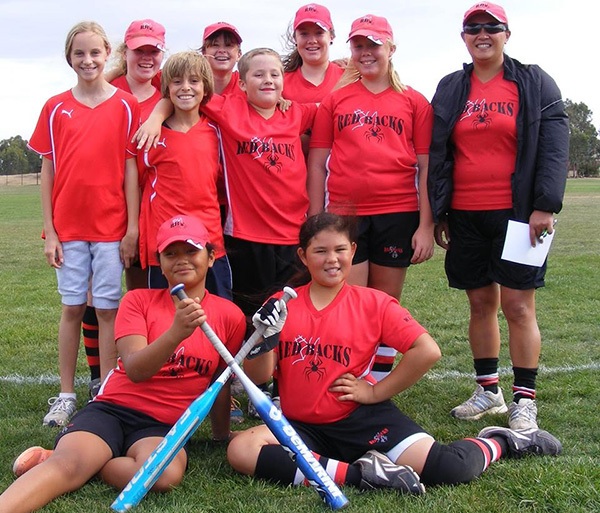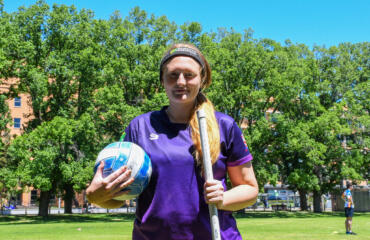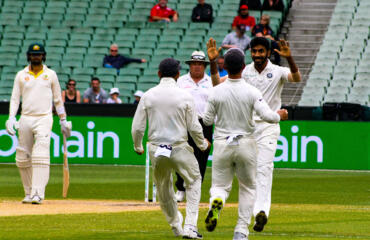Melina Triulcio instantly recalls 1977 as the year she stopped playing competitive softball. She was a 16-year-old high school student.
Four children and 22 years later, Triulcio decided it was time to pick up her bat and ball and play her beloved game again. And for the next 13-plus years she was so determined to play softball that she made the trek from her home in Coburg to play in a league in Melbourne’s west.
But three years ago, Triulcio decided she’d had enough and it was time to bring the game back to Coburg.
She approached the West Coburg Sports Club and the Red Backs softball team became a reality. Now, the club fields four teams and has more than 60 members, the majority women and girls.
“I just wanted to see what would happen if I brought softball home to Coburg,” Triulcio says proudly. “And it’s been embraced with open arms.”
As it happened, the creation of the softball teams at the West Coburg club was symbolic of the City of Moreland’s initiative launched a year earlier to encourage more female participation in sport — and more women staking their claim to council-owned and operated sporting grounds.
For the first time, a local council in Victoria required all sporting clubs bidding to lease council grounds to show they were inclusive of women and juniors, or risk losing their access to grounds and facilities.
“The more choice you have coming into a sport regardless of gender, the more you open doors for everyone.” — Melina Triulcio
Geoff Law, the secretary of the West Coburg Sports Club, says the decision to expand into softball and netball was influenced by the incentives the council was offering to clubs willing to give girls and women a fair go.
“The policy came with a bit of a carrot in the form of giving inclusive clubs preference in funding, grants and facilities,” says Mr Law. It proved a “big factor” in the expansion of West Coburg into softball and netball, which had long fielded male dominated football and cricket teams.
Five years ago only 30 to 40 girls were playing for West Coburg teams. Now, among its 700 listed players are 200 girls and women playing football, cricket, netball and softball, as well as participating in athletics.

Moreland’s women participation officer, Brooke Mezzetta, says the municipality’s ground-breaking strategy initially was met with mixed feelings among local sports clubs.
But the policy has since become widely-accepted practice and most clubs have either expanded into traditionally female sports or set up mixed teams to be more inclusive.
In 2009, just eight per cent of all players accessing Moreland’s sports grounds were female. By 2013, female sports participation had more than doubled to nearly 20 per cent and continues to rise.
“We are the only council to have written out an inclusive women’s sports policy in black and white,” says Mezzetta. “And it’s working.”
But the moves are not just about levelling the ratio of male and female competitors and providing equal access to community-funded facilities. Promoting gender equality in all aspects of life is seen as a means of preventing violence against women. Research shows that a key cause of violence against women is persisting gender inequity throughout society.
While for many years local government has responded to such violence by providing essential services and support, a number of municipalities are increasingly focusing on the other end of the spectrum, aiming to prevent violence against women before it happens via community-funded programs and initiatives such as Moreland’s sports strategy.
“I think the more we can to do raise awareness around gender equity, the more we get back from the community. It’s about allowing everyone to come on the journey.”
— Cr Sarah Carter, Maribrynong City
Since 2010, the Municipal Association of Victoria, the peak legislating body for local government and the intermediary with state legislators, has been leading the state in programs encouraging gender equity, particularly in addressing the underlying causes of violence against women.
Kellie Nagle, MAV’s policy advisor for preventing violence against women, says local governments are a “national leader” in the area of gender equity and preventing violence against women. Four years ago, the MAV released its leadership statement on preventing violence against women and has since been directing local councils towards gender equity strategies.
“The MAV’s leadership role is actively communicated across 79 councils and what it commits to is taken seriously across council,” says Ms Nagle.
The MAV has established a preventing violence against women network, a leadership group with ambassadors drawn from local government, a gender equity section on its website and bi-monthly newsletters with more than 160 local government representatives subscribed.
“What the MAV is doing across councils is to illustrate how we can actually do things differently,” says Ms Nagle. “Momentum is growing in a relatively short space of time, especially because there is good sharing across councils.”
The City of Maribrynong has been one of the leading councils in gender equity since VicHealth funded a three-year pilot project to reduce violence against women in the western region in 2009.
One strategy implemented by Maribrynong was an audit of council-run facilities to assess how inclusive and safe they were for women. Facilities that were assessed included sporting clubs, maternal and child-care centres, libraries and community halls.
The tool assessed the design of community facilities in terms of isolation, lighting, possible assault sites, CCTV footage, maintenance and car parks, and raised questions about gender and community safety across Maribrynong.

Maribrynong councillor and gender equity ambassador Sarah Carter says local government is granted privileged access to the community and can be a real driver of change for gender equity and preventing violence against women.
She says Maribrynong is putting its “money where its mouth is” when it comes to promoting gender equality. With more than $308 million worth of infrastructure and assets, Maribrynong is continuing to “develop an equitable framework based on a gender-lens to be used across a diverse range of council services,” she adds.
“I think the more we can to do raise awareness around gender equity, the more we get back from the community. It’s about allowing everyone to come on the journey.”
Meanwhile, in Melbourne’s north-east, the City of Whittlesea is in the early stages of a suite of gender equity initiatives and is looking towards councils with established gender equity programs, such as Maribrynong, as its model.
After Hume, the City of Whittlesea has the highest reported incidents of family violence in Melbourne’s northern region. Between 2007 and 2010 the rate of family violence reported to the police rose by 30 per cent in Whittlesea.
Kathy Greer, Whittlesea’s social policy and project officer, says these statistics and the growing momentum towards gender equity across councils prompted Whittlesea to act.
“Insuring men and women have equal access to the things they need for their wellbeing applies to a whole range of our core functions as Council.” — Kathy Greer, City of Whittlesea
Sports pavilions in Whittlesea have since been upgraded using Maribrynong’s facility audit tool to make them more accessible for women and girls. Ms Greer says that gender equity is integral to the council’s responsibilities. “Insuring men and women have equal access to the things they need for their wellbeing applies to a whole range of our core functions as Council.”
Apart from new facility design and its collaboration with the MAV, Whittlesea is also extending parental child health programs into weekends and after hours to improve participation with men.
Moreland’s Brooke Mezzetta says that the ‘Active Women and Girls in Moreland’ strategy is just the beginning of affirming gender equity in sport in the municipality. The next stage of the policy will require at least one fully female team per club in order to secure approval of sports ground allocation.
She is also looking to introduce a prevention of violence against women oath that each club can swear to and display in its clubroom. “It’s about raising the bar every year to get the message out there,” says Ms Mezzetta.
After years of negotiation with Moreland Council, the West Coburg Sports Club is getting an upgrade to its facilities in Morris Reserve, Pascoe Vale. The new facilities include a gym, pavilion and netball courts with synthetic surfaces.

“The only thing holding us back from getting more girls involved is the lack of facilities around here,” says club secretary Geoff Law. “Once we have our new facilities, we’ll be able to increase the participation rates of women and girls immensely.”
In the distant future Melina Triulcio is also planning to set up a male-only softball team. “The more choice you have coming into a sport regardless of gender, the more you open doors for everyone.” Her 18-year-old son plays in the under-19 softball team and “absolutely loves it”.
For now, she is dreaming big for the Red Backs softball team. “My ultimate dream would be if council built one or two [playing] diamonds and we could get the schools involved to compete against each other and we can keep growing.”

► If you or someone you know is impacted by sexual assault, domestic or family violence, call 1800RESPECT on 1800 737 732 or visit 1800RESPECT.org.au. In an emergency, call 000. For more information about a service in your state or local area download the DAISY App in the App Store or Google Play.



